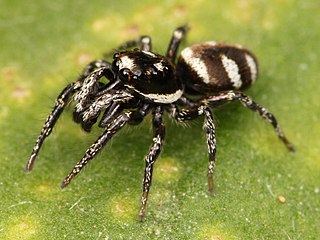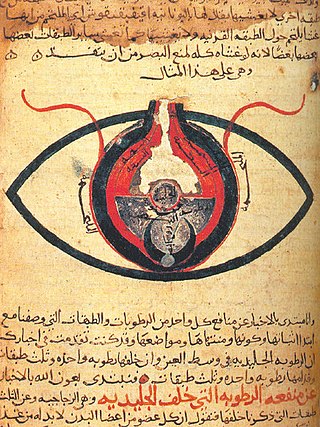Under Dusken is the official student newspaper in Trondheim, Norway, with a circulation of 10,000 copies. Founded in 1914, it is Scandinavia's oldest student newspaper, and the second largest student newspaper in Norway after Oslo's Universitas.

Carl Alexander Clerck was a Swedish entomologist and arachnologist.

The zebra spider is a common jumping spider of the Northern Hemisphere. Their common name refers to their vivid black-and-white colouration, whilst their scientific name derives from Salticus from the Latin for “dancing”, in reference to their agility, and the Greek scenicus, translating to “theatrical” or “of a decorative place,” in reference to the flashy, zebra-like coloration of the species.

Ophthalmology was one of the foremost branches in medieval Islamic medicine. The oculist or kahhal (کحال), a somewhat despised professional in Galen’s time, was an honored member of the medical profession by the Abbasid period, occupying a unique place in royal households. Medieval Islamic scientists considered it normal to combine theory and practice, including the crafting of precise instruments, and therefore found it natural to combine the study of the eye with the practical application of that knowledge. The specialized instruments used in their operations ran into scores. Innovations such as the “injection syringe”, a hollow needle, invented by Ammar ibn Ali of Mosul, which was used for the extraction by suction of soft cataracts, were quite common.

Araneus is a genus of common orb-weaving spiders. It includes about 650 species, among which are the European garden spider and the barn spider. The genus was erected by Carl Alexander Clerck in 1757.

Dwarf tarantulas, also known as sheet funnel-web spiders are a type of spider from the family Mecicobothriidae. Dwarf tarantulas are one of several families of the suborder Mygalomorphae; this larger group also includes the true tarantulas.

Charlotte's Web 2: Wilbur's Great Adventure is a 2003 American animated direct-to-video musical adventure film. The sequel to the 1973 film Charlotte's Web, this film was produced by Paramount Pictures, Universal Cartoon Studios and Nickelodeon, with distribution by Paramount Home Entertainment in North America and Universal Studios Home Entertainment internationally.

Haramiyida is a possibly polyphyletic order of mammaliaform cynodonts or mammals of controversial taxonomic affinites. Their teeth, which are by far the most common remains, resemble those of the multituberculates. However, based on Haramiyavia, the jaw is less derived; and at the level of evolution of earlier basal mammals like Morganucodon and Kuehneotherium, with a groove for ear ossicles on the dentary. Some authors have placed them in a clade with Multituberculata dubbed Allotheria within Mammalia. Other studies have disputed this and suggested the Haramiyida were not crown mammals, but were part of an earlier offshoot of mammaliaformes instead. It is also disputed whether the Late Triassic species are closely related to the Jurassic and Cretaceous members belonging to Euharamiyida/Eleutherodontida, as some phylogenetic studies recover the two groups as unrelated, recovering the Triassic haramiyidians as non-mammalian cynodonts, while recovering the Euharamiyida as crown-group mammals closely related to multituberculates.
In the 10th edition of Systema Naturae, Carl Linnaeus classified the arthropods, including insects, arachnids and crustaceans, among his class "Insecta". Wingless arthropods were brought together under the name Aptera.

Tetragnatha extensa is a species of spider found across the Northern Hemisphere. It has an elongate body, up to 11 mm (0.43 in) long, and adopts a straight line posture when alarmed. It lives on low vegetation in damp areas, and feeds on flying insects which it catches in its web.
Antônio Domingos Brescovit is a Brazilian arachnologist. His first name, Antônio may also be spelt António. He develops academic activities at the 'arthropodae laboratorium' at the Butantan Institute, and he is a specialist in Neotropical Arachnida.

Parmenini is a tribe of longhorn beetles of the subfamily Lamiinae.

Siamusotima aranea is a species of moth of the family Crambidae first described by Maria Alma Solis et al. in 2005.
Microcleptes is a genus of longhorn beetles of the subfamily Lamiinae, containing the following species:

Final Fantasy XV, an action role-playing video game released in November 2016, is the fifteenth main installment in the Final Fantasy series, and is thematically connected to Fabula Nova Crystallis Final Fantasy, a subseries of games linked by a common mythos which includes Final Fantasy XIII and Final Fantasy Type-0. The world and main characters were created by Tetsuya Nomura, the game's original director. Nomura also designed the main characters, with later revisions and additional characters being designed by Yusuke Naora: other character designers involved with the game included Roberto Ferrari and Yusaku Nakaaki.
Microcleptes variolosus is a species of beetle in the family Cerambycidae. It was described by Léon Fairmaire and Germain in 1859. It is known from Chile.
Somatidia aranea is a species of beetle in the family Cerambycidae. It was described by entomologist Arthur Sidney Olliff in 1889. It is known from Australia and New Zealand.
Somatocleptes apicicornis is a species of beetle in the family Cerambycidae. It was described by Fauvel in 1906, originally under the genus Microcleptes.

Final Fantasy XV: The Dawn of the Future is a fantasy novel, written by Emi Nagashima and published by Square Enix. It is based on the universe and characters of Final Fantasy XV, an entry in the company's long-running Final Fantasy franchise. It was first released in Japan in April 2019, before being released worldwide in June 2020 as one of the debut titles in the company's newly formed Western publishing house.











